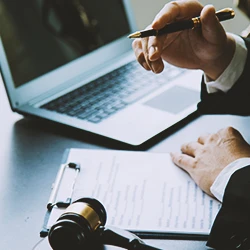Ever faced false accusations, feeling the weight of uncertainty and legal complexities bearing down on you?
False allegations can have devastating outcomes, affecting one’s life and leading to criminal and civil repercussions.
The impact of these accusations can be further exacerbated by false statements, which can complicate the situation and challenge the credibility of the accuser.
With over a decade of experience as a criminal defense attorney, I’ve helped numerous individuals navigate similar circumstances.
Now, let me offer you guidance by providing you with the right strategies to unravel the legal intricacies to defend yourself and reclaim your innocence.
Quick Summary
- If someone has wrongly accused you of a crime, you should take action to strengthen your case by preserving evidence that proves your innocence and avoiding any contact with the person accusing you.
- If your criminal charges are based entirely on eyewitness identification, there are ways to determine if their description is accurate.
- Gather evidence to support your side of the story. Make sure to gather evidence that has the potential to challenge false accusations.
8 Ways To Defend Yourself Against False Accusations

1. Preserve Your Composure
The mental and physical anguish can be overwhelming when wrongly accused of wrongdoing.
In such circumstances, it is understandable to want to fight back immediately to protect yourself; however, doing so with haste may not prove beneficial for your cause.
2. Have a Lawyer On Your Side
When you are accused of a criminal or civil trial crime, consulting an experienced criminal defense attorney should be your priority.
An attorney has a thorough knowledge of all state and federal laws relevant to your case and the ability to clarify any regulations related to false allegations against you.
3. Collect Evidence

When falsely accused of a crime, your priority should be to procure evidence proving your innocence.
It is not the accused's job to prove their purity; instead, they must only present enough reasonable doubt that makes it unlikely for them to be guilty of the offense.
It is essential to maintain meticulous records if facing a difficult divorce or child custody battle; doing so will allow you to present proof of innocence in criminal court and verify that any false claims leveled against you are unfounded [1].
4. Discredit The Accuser's Reliability
After consulting with your attorney, you can both devise a plan to fight the unfounded allegations made against you.
This strategy may vary depending on the accusation type and whether it's criminal or civil court proceedings. A practical approach revolves around discrediting the accuser's credibility [2].
5. Gather Witnesses To Support Your Argument

You can use individuals who can testify in your favor or attest to another person's wrongdoings.
When falsely accused of a crime, your priority should be to procure evidence proving your innocence.
Read Also: Top 5 Signs That a Criminal Case is Weak
6. Develop Your Winning Criminal Defense Strategy
If you face criminal charges, it's essential to enlist the help of a seasoned criminal defense attorney. A qualified lawyer will gather evidence and locate witnesses to refute any untruthful claims against you.
By providing an effective legal strategy tailored to your needs, lawyers ensure that one is much less likely to plead guilty due to being falsely accused.
7. Turn The Charges Around

In some cases I have worked on, pleading guilty was the best solution to help resolve a problem.
Although this process may seem unfair and unjust, it could be beneficial in achieving a lenient penalty and avoiding creating a permanent criminal record.
Related Article: Can I Sue Someone for Slander?
8. Take A Polygraph Test
Polygraph tests measure various physiological responses such as blood pressure, pulse, and breathing rate to determine if someone is lying.
While the results of a polygraph test are not admissible in court as evidence, they can be used to convince the accuser or the authorities of your innocence [3].
If you want a fighting chance, you must refute the state's evidence with even more convincing evidence that you are innocent. Often, the state will bring on evidence manufactured using faulty "scientific" methods supported by expert witnesses. - Shawn Wygant, Forensic Psychology Associate
What Should You Not Do When Falsely Accused Of A Crime?

Here are a few other things you should never do to prevent making matters worse.
- Do not destroy any evidence that might make you look guilty; you could be charged with obstructing justice.
- Do not have any contact with the victim or witnesses of the case, as it may be perceived as an attempt to influence their testimony and harm your case.
- Do not speak with the police unless you have a lawyer, prosecutor, or criminal investigator present. This is to protect your rights and avoid making statements that could be used against you.
Do not give your consent for DNA or other tests requested by the police without your attorney present.
Why Someone May Be Falsely Accused of a Crime?

In my experience, these two reasons are often the driving forces behind false accusations.
It is also possible for someone to deliberately level an unfounded charge against you after feeling wronged in some way.
1. Revenge
Fabricating criminal accusations is often used as revenge against someone.
Dealing with legal proceedings can be lengthy and costly, making it an effective instrument of torment for those bent on retaliatory measures.
Although law enforcement should have the capacity to recognize signs of malice when obtaining witness statements, false accusations continue to cause major repercussions.
2. Mistaken Identity
If you are falsely accused of a crime due to mistaken identity, it is essential to highlight any lack of witness credibility by demonstrating their mistake. Doing so can protect your rights and ensure justice is served.
Related Articles:
FAQs:
1. What Do False Accusations Look Like?
False accusations look like forgetfulness, misidentification, malicious intent, false evidence such as DNA or fingerprints, and the misconduct of law enforcement personnel or other officials are all potential causes of a wrongful conviction.
2. Can You Sue An Accuser Over A False Accusation?
Yes, you can sue an accuser over a false accusation for both economic and non-economic damages and receive monetary compensation. Nevertheless, recovering in an anti-SLAPP motion can be exceptionally difficult. If you don't succeed with your claim, you may even have to reimburse the opposing party for their attorney fees.
3. How Can I Legally Defend Myself Against False Accusations?
You can legally defend yourself against false accusations by gathering evidence that proves your innocence, maintain detailed records, and consult with an experienced criminal defense attorney to guide you through the legal process.
4. What Role Does Evidence Play in Disproving False Accusations?
The role that evidence plays in disproving false accusation is crucial. It can provide tangible proof of your innocence, challenge the accuser's credibility, and create reasonable doubt regarding the allegations.
5. Why Is It Important to Hire a Criminal Defense Attorney When Falsely Accused?
It is important to hire a criminal defense attorney when falsely accused because they have the expertise to navigate the legal system, build a strong defense, and protect your rights throughout the process.
6. Can Witnesses Help in Defending Against False Accusations?
Yes, witnesses can help in defending against false accusations by providing testimonies that corroborate your version of events and challenge the credibility of the accuser's claims.
Are You Facing False Allegations?
If you're looking for an experienced criminal defense lawyer, look no further than Schmidt & Clark, LLP. Our accomplished attorneys have been standing up for defendants in courtrooms nationwide with success.
We specialize in protecting our clients from false accusations and unjust convictions. Let us put our years of experience to work defending your rights.
Our firm employs bold strategies and aggressive tactics to ensure positive results for our clients.
Contact us for a free consultation session, and we'll take time to hear out every detail and construct a customized plan just right for your civil lawsuit.
References:
- https://www.iowacourts.gov/for-the-public/representing-yourself/child-custody
- https://www.state.gov/disarming-disinformation/
- https://definitions.uslegal.com/p/polygraph/

 Published by
Published by